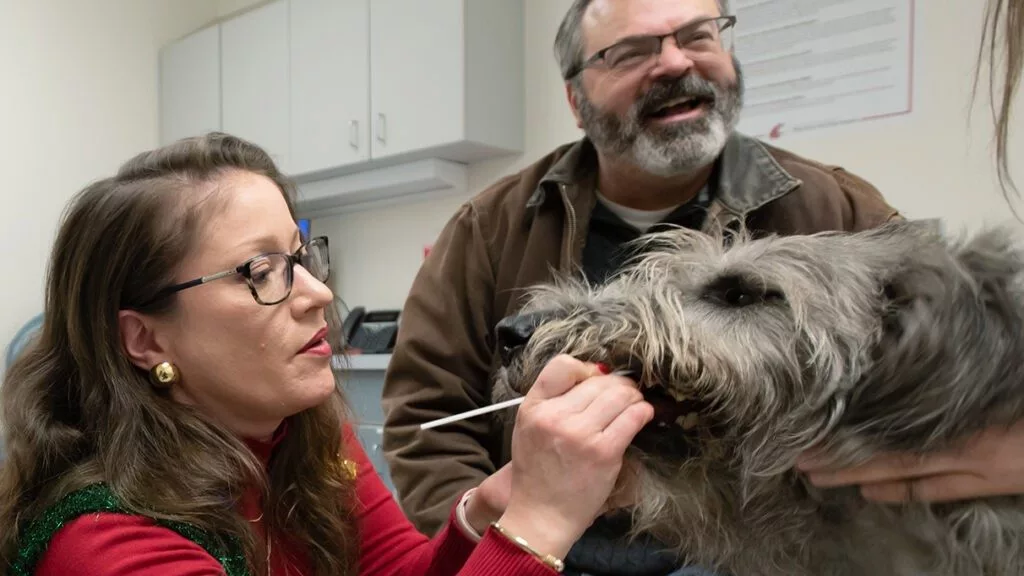(Pullman, WA) Perfectly healthy pets can be hiding tiny genetic mutations that lie silently in wait, often undetectable for years until striking with deadly consequences.
These hidden mutations are the focus of much of the work of researchers like Dr. Michael Court in the Program in Individualized Medicine (PRiMe) in Washington State University’s College of Veterinary Medicine. Rather than waiting for symptoms to emerge – potentially when it is too late – Court and his peers are using advanced genetic techniques to develop methods and tools that can be used by veterinarians to identify, predict, diagnose and treat these silent threats.
“This – precision medicine – is the future of veterinary medicine,” Court said. “Just like what is already being done in human medicine, we are going to be able to use genetic information to identify disease risks early, guide treatments more effectively, and even prevent diseases altogether in our animal patients.”
Addressing the threat of malignant hyperthermia
Having practiced as a veterinary anesthesiologist for years, Court, a veterinarian and professor of pharmacology and genomics, has twice witnessed firsthand the deadly effects of a condition known as malignant hyperthermia, a rare adverse reaction to commonly used anesthetics believed to be fatal in 50% of the cases involving dogs.
The condition, though, didn’t become a focus for Court until he received blood samples from a golden retriever and a pit bull that had each died following the administration of anesthesia drugs.
The 1-year-old golden retriever was the picture of health when he was dropped off by his owners at a veterinary clinic in north Idaho for a routine neuter and extraction of a troublesome tooth. But roughly midway through the procedures, the dog’s body became locked in rigid spasms as his heart rate surged to 190 beats per minute and his temperature soared to 108.8 degrees. Cardiac arrest followed, and despite all efforts, the dog never regained consciousness.It was textbook malignant hyperthermia.Genetic mutations have long been suspected to predispose dogs to the condition, but little was known about the nature of those mutations. Court set out to use precision medicine techniques, like next-generation sequencing, to pinpoint the gene mutation or mutations responsible for the disease and develop tests to identify at-risk dogs and prevent future tragedies.To tackle the challenge, he had a starting point in previous studies on humans with malignant hyperthermia. In humans, the condition affects roughly one in 10,000 people and has been linked to several genetic mutations.“The idea is that we know this malignant hyperthermia is caused by mutations in a small number of genes in people,” Court said. “So, we focus on those genes in dogs and look for mutations close to those found in humans. We can apply the same methods to other conditions as well.”For the pit bull, the mutation was identical to one already known in humans. In the golden retriever, however, the mutation was a new discovery that had not been documented. Court determined it had arisen spontaneously.“With each generation, you have a certain number of genetic changes,” Court said. “While most are beneficial or neutral, some are harmful. In this case, it was one of those harmful mutations.”With the mutations identified, Court and his team were able to develop tests to determine the golden retriever’s parents and littermates did not carry the gene.The findings were published in the journal Veterinary Anaesthesia and Analgesia. Dr. Tania Perez, an anesthesiologist at WSU, assisted with the study and served as first author.“It took us a couple of years because we were still trying to work out these new techniques,” Court said. “It’s great because now other researchers and clinicians can consider using this approach to identify the genes responsible for other conditions.”
Advancing veterinary care through precision medicine
Court’s work is just one example of how PrIMe is advancing veterinary care through precision medicine.Dr. Katrina Mealey, a veterinarian and pharmacologist, was the first to identify the MDR1 gene mutation in dogs and cats that can make common medications, including those used for parasite control and cancer treatments, potentially lethal. She also developed the first genetic tests to detect the mutation, which is present in up to 4% of all cats and many full and mixed dog breeds, most notably herding breeds like collies and Australian shepherds.Similarly, fellow veterinarian and pharmacologist Dr. Nicholas Villarino has made significant progress toward identifying biomarkers to identify cats at risk for kidney disease.Court’s own work also extends beyond malignant hyperthermia. Spurred by a request from the Scottish Deerhound Club of America, he recently identified a gene associated with delayed postoperative hemorrhage, a potentially fatal condition that causes excessive bleeding and bruising after surgery, and developed a test to identify at-risk dogs.
‘Another diagnostic tool in the veterinarian’s toolbox’
The work completed to date in PRiMe is just the beginning. Court envisions a future where genetic testing becomes a routine part of veterinary care. Genetic testing panels, similar to blood chemistry panels, will help to assess disease risks and drug sensitivities in individual pets, enabling more personalized and effective treatments.“It is going to be another diagnostic tool in the veterinarian’s toolbox,” Court said. “This technology is going to help develop potential treatments or, at the very least, to help us better understand how to treat or prevent the conditions more effectively. Just as importantly, we can identify animals very early in their life that may be genetically predisposed to a condition.”





